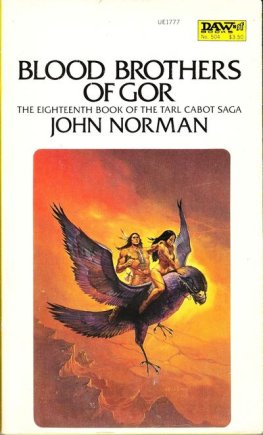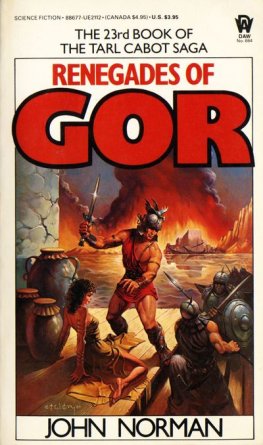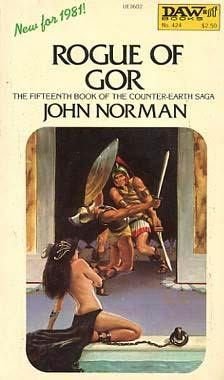John Norman - Mariners of Gor
Here you can read online John Norman - Mariners of Gor full text of the book (entire story) in english for free. Download pdf and epub, get meaning, cover and reviews about this ebook. genre: Romance novel. Description of the work, (preface) as well as reviews are available. Best literature library LitArk.com created for fans of good reading and offers a wide selection of genres:
Romance novel
Science fiction
Adventure
Detective
Science
History
Home and family
Prose
Art
Politics
Computer
Non-fiction
Religion
Business
Children
Humor
Choose a favorite category and find really read worthwhile books. Enjoy immersion in the world of imagination, feel the emotions of the characters or learn something new for yourself, make an fascinating discovery.

- Book:Mariners of Gor
- Author:
- Genre:
- Rating:5 / 5
- Favourites:Add to favourites
- Your mark:
- 100
- 1
- 2
- 3
- 4
- 5
Mariners of Gor: summary, description and annotation
We offer to read an annotation, description, summary or preface (depends on what the author of the book "Mariners of Gor" wrote himself). If you haven't found the necessary information about the book — write in the comments, we will try to find it.
Mariners of Gor — read online for free the complete book (whole text) full work
Below is the text of the book, divided by pages. System saving the place of the last page read, allows you to conveniently read the book "Mariners of Gor" online for free, without having to search again every time where you left off. Put a bookmark, and you can go to the page where you finished reading at any time.
Font size:
Interval:
Bookmark:
John Norman
Mariners of Gor
Chapter One
And he spoke.
I sailed on the great ship, he said. Yea, the ship of Tersites.
It was lost at sea, said a man.
It sailed over the edge of the world, said another.
Listen, he said. And I will tell you a story.
For paga, laughed a Merchant.
We have heard such stories, said a fellow.
You are a liar, scoffed the taverner.
A thousand ships come and go, in the great harbor of Brundisium, said a fellow. There are a thousand stories.
But not of the ship of Tersites, he said.
No, said a fellow, not of the ship of Tersites.
There is no such ship, said a man. Tersites was mad, fled from Port Kar.
I hear banished, said another.
The ship was never built, said a man.
It was built, averred the fellow.
No, said a man.
In the northern forests, he said.
Absurd, laughed a man.
And debouched onto Thassa from the Alexandra, he said.
Have you seen it? asked a man.
I berthed upon her, he said.
Liar, said the taverner.
What happened? asked a man.
That is my story, said the man.
It was a small tavern, The Sea Sleen, only yards from the water, declining by a steep slope to the southern piers. It was late. Tharlarion-oil lamps hung on their slender chains, three to a lamp, adjusted variously, table to table, from the low, beamed ceiling. Most had been extinguished, as tables were vacated. The few lamps remaining alit put out little light, the wicks shortened to conserve fuel. There were no musicians. The dancing sand was empty. Given the nature and paucity of its custom, The Sea Sleen could afford to hire musicians only at the height of the season. It was now the second month in autumn, called in Brundisium the month of Lykourgos. The harbor was not now much trafficked. Mostly coasting. Until the arrival of the stranger, it had been muchly quiet. One might have heard the clink of a goblet now and then, the scraping of a wooden trencher on a low table, sometimes the crack of a kaissa piece being struck down on a board in an aggressive move. Outside, away from the portal, down the slope a bit, if one listened, one could hear the water lapping against the pilings, where the vast glory of looming Thassa, in the darkness, deigned to touch the small works of men. The Sea Sleen was not one of the higher, larger taverns in the great port of Brundisium, such as that of the Diamond Collar, the Joys of Turia, the Dina, the tavern of Chang, that of Hendow, or such. Her patronage was mostly that of ruffians, mariners between voyages, their coins now mostly spent, left in the higher taverns, drifters, wanderers, peddlers, exiles, some mercenaries, willing to unsheathe their blades for a bit of silver, or a fight. The stranger sat cross-legged at one of the small tables. Several were gathered about him. One could not see his face well in the half-darkness, but the reddish outline marked his place. Most of those about him were muchly in darkness. Some held cups of paga. The trenchers had been gathered in, and the kaissa boards had been folded and put away, the red and yellow pieces in two shallow drawers, fixed in the board, one on each side, one for each color. This is not an unusual arrangement in taverns. Commonly, however, kaissa boards are simple, straight boards, and the pieces are kept separately, in boxes or sacks. Members of the Caste of Players are recognized by their red-and-yellow-checked robes, the worn board slung over their shoulder, the sack of pieces at their waist. Depending on the Player, they will give you a game for as little as a tarsk-bit, as much as a golden tarn disk of Ar. It was said that Centius of Cos had once played in Brundisium.
If you have a story to tell, for a drink, said the taverner, why not tell it toward the upper city, against the outer walls, in a landward tavern, say, the Diamond Collar?
The stranger was silent. Then he said, I want paga.
I will tell you, said the taverner. You were ejected elsewhere, thrown into the streets, and stumbled downward, bewildered, blindly, mad, knowing nothing else, stumbling from door to door, until you would reach the piers.
And then Thassa, dark, cold Thassa, said a man.
Paga, said the stranger.
Do you beg? inquired the taverner.
No, said the stranger, and the taverner, alarmed, sensing danger, stepped a bit back, but recovered himself, almost immediately.
The stranger was a large, spare man, with roughened hands, perhaps hardened from the oar, or from hauling on lines. He was clad in little more than rags. He did have a dirty mariners cap. I did not think it unlikely he had indeed ventured upon Thassa. Those hands, I did not doubt, might close about a mans throat, might break a mans neck.
I will pay, said the man.
You have coins? inquired the taverner.
No, said the man.
Extinguish the lamps, said the taverner to his man, who stood behind him.
The other tables were empty now, as their occupants had left, or had gathered with us, about the strangers low table.
The only lamp remaining lit then, of the hanging lamps, was the one in which we could see the outline of the strangers face. A bowl lamp did glow at the serving table, near the kitchen gate, near the paga vat, near the goblets.
I can pay, said the stranger.
With what? inquired the taverner.
I will tell you a story, said the stranger. His eyes had a wild, feral look.
We are closing, said the taverner. Then, looking to his man, he gestured toward the stranger. Eject him, he said.
Where will he go? What will he do? asked a fellow, a Scribe from his robes, of shoddy, faded blue.
Thassa, said a man, I think a mercenary. Dark, cold Thassa.
Perhaps, said a man.
No, said the stranger. No.
Come along, fellow, said the taverners man. There is garbage outside, in the sewer troughs. He put his hand on the strangers arm.
Do not touch me, said the stranger, quietly, politely, rising unsteadily to his feet. His voice was courteous, almost gentlemanly. But the taverners man did not mistake the tone of that voice, and removed his hand from the strangers arm.
It is time to go, said the taverners man, gently.
I will leave, said the stranger.
I would hear his story, said a man.
I will buy him paga, said another.
No, said the stranger.
I had not realized how large he was until he stood.
We are closing, called the taverner, suddenly, loudly, impatiently, for two figures, cloaked, hooded, stood at the portal, now within. They had entered silently. None of us had noticed them, lest it was the stranger.
I think he had noticed.
So, said the stranger to the two newcomers. You have found me.
Neither of the newcomers spoke, for their kind is efficient. They do quietly, and swiftly, what they have come to do. In such situations speaking is unnecessary, and sometimes dangerous, as it costs time. A moment of indulgence, of clever vanity, can cost one ones life. There are caste codes pertaining to such matters.
This was not a typical hunt, I gathered, in which the tunic is worn openly, the sign emblazoned publicly upon the brow, the prey helpless, cornered, as vulnerable as a vulo.
The cloaks parted and two crossbows, together, the quarrels set, were smoothly, swiftly raised.
At the same moment, the stranger bent down, seized up the small table, and flung it upward, and two quarrels splintered halfway through the wood. The strangers hands disappeared within his sleeves, and each hand emerged, a dagger in hand. The newcomers cast down the bows and, together, reached within their robes to unsheathe blades, the common gladius, but the cloaks, hitherto so convenient in concealing their caste, their intent, their weapons, cost them an unencumbered draw, and the stranger was at them, table flung aside, daggers like striking osts, moving twice, and the newcomers half fell, half stumbled, outside the tavern, into the darkness, the street outside, probably neither realizing for a moment that they had been killed.
Font size:
Interval:
Bookmark:
Similar books «Mariners of Gor»
Look at similar books to Mariners of Gor. We have selected literature similar in name and meaning in the hope of providing readers with more options to find new, interesting, not yet read works.
Discussion, reviews of the book Mariners of Gor and just readers' own opinions. Leave your comments, write what you think about the work, its meaning or the main characters. Specify what exactly you liked and what you didn't like, and why you think so.















